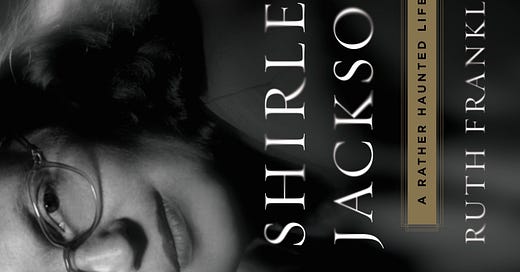Dear friends,
Less than a week to go before SHIRLEY JACKSON: A RATHER HAUNTED LIFE is officially out in the world! I'm so grateful for your support so far—I love seeing your Facebook posts and tweets. Just a reminder that anyone who preorders is eligible for a giveaway that includes all the Penguin Classics editions of Jackson's novels, plus her two memoirs. Just preorder the book from any source and email your receipt to shirleyjacksonbio@gmail.com with the subject GIVEAWAY. See my last email for more details.
To whet your appetite, I have a surprise: a sneak preview of the biography. One question I've gotten a lot concerns the book's subtitle: why did I choose it? To answer, here are the first few pages of the book. Enjoy!
Shirley Jackson often said that the idea for "The Lottery," the short story that shocked much of America when it appeared in The New Yorker on June 26, 1948, came to her while she was out doing errands one sunny June morning. She thought of the plot on her way home, and she immediately placed her toddler daughter in the playpen, put away the groceries she had just bought, and sat down to type out the story on her signature yellow copy paper. It was off to her agent the next day, with virtually no corrections: "I didn't want to fuss with it," she later said.
As origin stories go, this one—first told by Jackson and repeated countless times by others—is just about perfect. Its near mythic quality suits "The Lottery," a parable of a stoning ritual conducted annually in an otherwise ordinary village. And it sets up the reader for the surprise that follows: the angry, confused, curious letters from New Yorker subscribers that would soon overwhelm the post office of tiny North Bennington, Vermont, where Jackson lived. Some of the letter writers rudely announced that they were canceling their subscriptions. Others expressed puzzlement or demanded an interpretation. Still others, assuming that the story was factual, wanted to know where such lotteries could be witnessed. "I have read of some queer cults in our time," wrote a reader from Los Angeles, "but this one bothers me."
There is only one problem with Jackson's origin myth. It is not entirely true. The letters are real, all right—Jackson's archive contains a huge scrapbook filled with them. But her files show that certain details do not match up. The changes made to "The Lottery" were not as minimal as Jackson suggested they were; there is no evidence that Jackson's agent, as she would claim, disliked the story; and the period between submission and publication was a few months, not a few weeks. These details are relatively minor; they alter neither the meaning of the story nor the significance of its impact. But for the biographer, they are the equivalent of a warning siren: Caution! Poetic license ahead!
Some writers are particularly prone to mythmaking. Shirley Jackson was one of them. During her lifetime, she fascinated critics and readers by playing up her interest in magic: the biographical information on her first novel identifies her as "perhaps the only contemporary writer who is a practicing amateur witch, specializing in small-scale black magic and fortune-telling with a tarot deck." To interviewers, she expounded on her alleged abilities, even claiming that she had used magic to break the leg of publisher Alfred A. Knopf, with whom her husband was involved in a dispute. Reviewers found those stories irresistible, extrapolating freely from her interest in witchcraft to her writing, which often takes a turn into the uncanny. "Miss Jackson writes not with a pen but a broomstick" was an oft quoted line. Roger Straus, her first publisher, would call her "a rather haunted woman."
Look more closely, however, and Jackson's persona is much thornier. She was a talented, determined, ambitious writer in an era when it was still unusual for a woman to have both a family and a profession. She was a mother of four who tried to keep up the appearance of running a conventional American household, but she and her husband, Stanley Edgar Hyman, were hardly typical residents of their rural Vermont town—not least because Hyman was born and raised Jewish. And she was, indeed, a serious student of the history of witchcraft and magic: not necessarily as a practical method of influencing the world around her (it's debatable whether she actually practiced magical rituals), but as a way of embracing and channeling female power at times when women in America often had little control over their lives. "Rather haunted" she was—in more ways than Straus, or perhaps anyone else, realized.
*
A highlight of this pre-pub week for me was my appearance on Darkness Radio, a very entertaining talk show devoted to the paranormal. Host Dave Schrader and I talked about the impact of "The Lottery," why The Haunting of HIll House is so scary, and what witchcraft might have meant to Jackson. You can listen to the podcast here.
And don't forget about the book launch next Tuesday, September 27, at Greenlight Bookstore, 686 Fulton Street in Brooklyn. I'll be in conversation with the novelist Rivka Galchen. Please come!
All best,
Ruth
"No wise organism can continue for long to exist sanely under conditions of absolute reality; even larks and katydids are supposed, by some, to dream." —Shirley Jackson, The Haunting of Hill House



